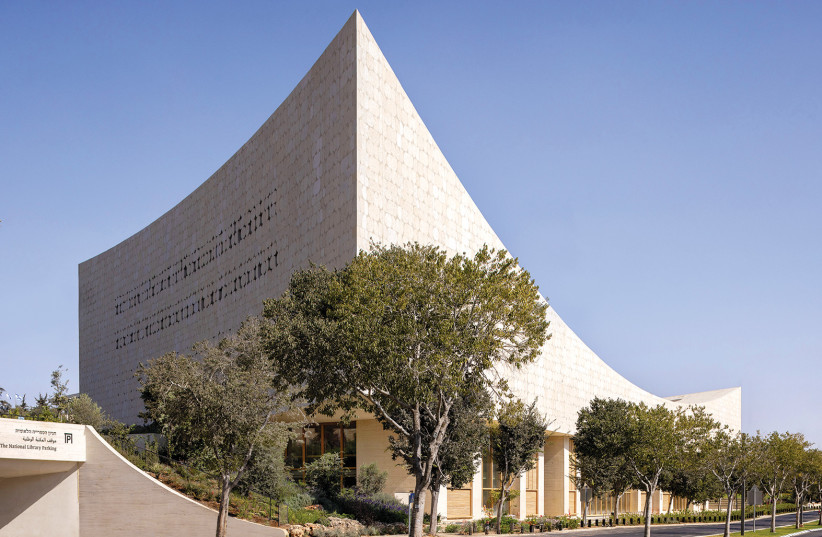In order to to preserve personal accounts of the Holocaust and the October 7 massacre, the National Library of Israel and the Shoah Foundation announced on Monday a partnership to provide Israelis with the first countrywide full access to the Foundation's Visual History Archive, complete with tens of thousands of Holocaust testimonies and hundreds of October 7 testimonies.
While the archive has previously only been available to 180 universities and museums worldwide, through a National Library web portal, users with Israeli IP addresses will be able to search, stream, and download the testimonies collected by the Shoah Foundation. The Foundation has collected around 52,000 Holocaust survivor accounts and 400 accounts by October 7 survivors and eyewitnesses.
“It is vitally important that all our testimonies are available in Israel, where nearly half of the world’s remaining Holocaust survivors and the vast majority of October 7 survivors live,” Shoah Foundation Executive Director Dr. Robert Williams said with the partnership’s announcement.
“The USC Shoah Foundation’s archive contains uniquely powerful sources that inform education, research, and awareness-raising initiatives that bring people and societies face-to-face with the human beings who survived the world’s oldest hatred. By giving scholars, educators and the wider public additional access to these testimonies through the National Library of Israel (NLI), we are helping connect the past with the present in ways that can secure a better future for Israel and the wider international community.”
'Never Again' for generations to come
NLI Chairman Sallai Meridor said in a statement that the agreement would “deepen the understanding of Israelis of all backgrounds and faiths as to the horrors of the Shoah and its lessons, to humanity’s nadirs and zeniths, from the lowest levels of cruelty, brutality, and malice to the highest points of resilience, faith and courage. We invite all users of the National Library website to watch and witness these testimonies, and hope fervently that our resolute pledge of ‘Never Again’ will continue to guide generations to come.”

Williams, who also serves as UNESCO Chair on Antisemitism and Holocaust Research and Adviser to the International Holocaust Remembrance Alliance, told The Jerusalem Post that he believed the cooperation between the NLI and the foundation would allow the sharing of best practices in the study and recording of the Holocaust.
“We need to understand the Holocaust, so we can avoid the conditions that led to it,” said Williams.
He spoke to The Post on Monday during a visit to Israel, which included meeting with “October 7 survivors who entrusted us with their testimony.” He said there is a moral obligation to provide these materials to an Israeli institution, to provide understanding and healing. The NLI, which opened its new building on October 29, said in the agreement announcement that it would serve as a central repository cataloging October 7 testimonies collected by the Shoah Foundation and other organizations.
Denial of the atrocities of October 7 quickly became prevalent among anti-Israel and antisemitic actors, said Williams, with some demanding to see pictures of murdered infants. The Foundation would soon launch a major media campaign to present and draw attention to the evidence.
The Shoah Foundation is also building a collection of survivors’ testimony of antisemitism since 1945. Williams said that they would seek to build a more nuanced understanding of the experiences with virulent hatred beyond what people may be familiar with, such as life in North Africa before moving to Israel, or the accounts of Ethiopian Jews facing discrimination.
This will include antisemitic terrorist attacks, such as the 2018 Pittsburgh Tree of Life Congregation 11 murders, the 1994 Asociación Mutual Israelita Argentina bombing, and the 2014 Jewish Museum of Belgium shooting. The collection is set to catalogue accounts from the Middle East and North Africa, Ethiopia, under communist regimes, and in Europe and North America.
“Our collective work will represent the most comprehensive archival effort to chronicle antisemitic violence,” Williams said in a statement about the partnership. “Researchers and storytellers – now and in the future – can turn to these archives as an irrefutable, publicly available resource to rely on in the ongoing fight against antisemitism.”
Williams wants the people of Israel to know that the foundation is a resource for them. He also praised the NLI, saying that its materials, cutting edge presentation and ground breaking research made it “not just a blessing to Israel, it’s a blessing to the world.”
